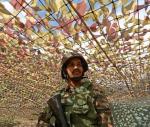TUNIS — Probes into the assassinations last year of two opposition figures that plunged Tunisia into crisis have gathered pace this week, with authorities saying they arrested a suspect and killed another in a firefight.
Early on Sunday, the interior ministry said it arrested a man suspected of involvement in the murder of leftist MP Mohamed Brahmi after a fierce gun battle during an overnight raid on a militant hideout near Tunis.
The announcement came after the government said Tuesday that the suspected Islamist assassin of opposition politician Chokri Belaid had been killed in a police raid.
Belaid and Brahmi were gunned down in February and July 2013 respectively. The moderate Islamist Ennahda Party that was leading the government at the time blamed jihadists for their murders.
The killings came as Tunisia was grappling with the political transition after the 2011 uprising that toppled the autocratic regime of veteran strongman Zine Al Abidine Ben Ali, and a surge in Islamist violence.
The politicians’ killings triggered massive anti-government protests, plunging the country into crisis and forcing two consecutive governments led by Ennahda to resign.
Tunisia is only now emerging from the crisis, with the adoption in January of a new constitution after a government of independents took the oath to steer the country towards fresh elections.
On the eve of first anniversary of Belaid’s murder on February 6, authorities said his suspected Islamist assassin, Kamel Gadhgadhi, had been killed in a police raid.
On Sunday interior ministry spokesman Mohamed Ali Aroui told AFP that security forces had carried out a raid overnight and arrested Hmed Al Melki, better known as the “Somali”, over Brahmi’s murder.
Security forces “surrounded a house where a terrorist group had holed up. Following a sustained exchange of fire, four elements were arrested,” Aroui said.
“Among them is Hmed Al Melki, alias ‘Somali,’ one of the elements implicated in the assassination of the martyr Mohamed Brahmi,” he said, adding weapons were seized during the raid.
Relatives demand the ‘whole truth’
Brahmi’s son, Adnan, told AFP that Melki’s arrest was a relief for the family “because it will shed the whole truth on my father’s assassination, and especially who ordered the killing”.
Authorities blamed the murders on the Ansar Al Sharia, a jihadist outfit accused of having links to Al Qaeda, but the group never claimed responsibility for those or any other attacks.
Relatives of the murdered leaders and members of the mainly secular opposition had accused Ennahda of responsibility for its failure to tackle a rise in jihadist violence since the 2011 uprising.
Earlier this week Belaid’s widow, Basma Khalfaoui, accused Ennahda of hiding key documents in the murder inquiry.
“We don’t know anything [about what really happened]. All scenarios are possible,” she told AFP.
She also said she expected the new government of independents that replaced the Islamist-led administration to shed new light on her husband’s murder.
Khalfaoui said the suspect killed during a 20-hour siege of a Tunis house earlier this week and identified as Gadhgadhi may have pulled the trigger, but “there are other suspects” in Belaid’s killing.
Belaid’s brother Abdelmajid echoed her remarks saying: “We want to know the whole truth. Gadhgadhi was not alone.”
Brahmi’s widow, speaking Saturday during a rally marking the first anniversary of Belaid’s funeral, accused the authorities of having “done everything to wipe out the traces of the crime”.
A group of lawyers, meanwhile, said they planned to ask for a UN special rapporteur to look into what one of them called a “state crime”.
Ennahda won Tunisia’s first free elections in October 2011, following Ben Ali’s ouster in the uprising.
Last month, following a hard-won agreement with the opposition, Ennahda stepped down in favour of a government of technocrats, as parliament approved a new constitution.
The new government tasked with preparing elections not only faces the challenges posed by the rising violence carried out by jihadists, but must also deal with social unrest fuelled by economic difficulties.
















